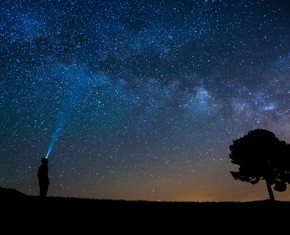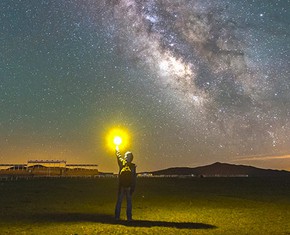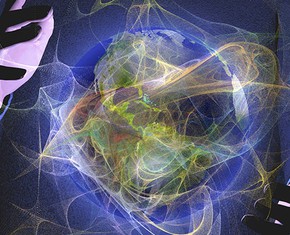The views expressed in our content reflect individual perspectives and do not represent the authoritative views of the Baha'i Faith.
As the sun is to the body of a man so is the Sun of Truth to his soul. – Abdu’l-Baha, Paris Talks, p. 31.
At an American Congressional representative’s public Town Hall meeting the other day, an 11-year-old girl asked: “Do you believe in science?”
Here’s the full text of young Hannah Bradshaw’s question for the congressman, from a radio news report: “What are you doing to help protect our water and air for our generations and my kids’ generations? Do you believe in science? Because I do.”
The congressman said he opposed pollution but also that he favors energy from coal. The large crowd at the Town Hall meeting booed him loudly. Hannah Bradshaw scoffed, too.
All around the world, we see this kind of anti-scientific irrationality running rampant in our political and social discourse. Just about everyone past the age of ten knows that burning fossil fuels like coal pollutes the air we breathe. Coal, science reliably tells us, is an inherently dirty fuel, one that always causes pollution when burned. No one has figured out a way to change that basic rule of nature yet, even though some politicians and lobbyists throw around Orwellian phrases like “clean coal” to make it sound better.
Here are the facts: when they use mandated pollution-abatement equipment, coal-fired power plants and factories can remove most, but not all, of the nitrogen oxides (NOₓ), sulfur dioxides (SO₂) and particulates that burning coal produces. But we have no workable technology capable of removing carbon dioxide (CO₂), mercury or radionuclides from burning coal—and we know that CO₂ heats our atmosphere and our oceans, just like we know that toxic mercury causes cancer.
So the real question becomes: are 11-year-olds smarter than most politicians?
It certainly seems that way these days. When even a child understands her scientific facts and their ramifications better than our elected policymakers, we’ve reached a remarkable point in our world’s history. When we provide politicians with accurate scientific information, and it doesn’t change anything, we can see that the decisions our policymakers pursue aren’t often well-informed, healthy or just. We can see, for some politicians, that short-term gain obviously trumps the long-term future.

Hannah Bradshaw
Thanks to science we know, for example, that enough of the sun’s energy pours down upon our Earth every day to provide humanity with all of its energy needs many times over. Yes, it would be costly to switch from fossil fuels to solar energy generation—but that cost pales in comparison to the long-term pollution costs we’re now putting on our virtual credit cards. In one or two generations, 11-year-old Hannah Bradshaw’s peers and children will have to pay off the massive interest and principle on those credit cards, in an attempt to return our planet to a healthy ecosystem and make it livable for their progeny. Your children and grandchildren, and mine, too, will suffer for the unscientific policy choices we make now.
So truth matters. In fact, it matters deeply, if we want to have a future. Science certainly has the ability, after centuries of accumulated knowledge, to give us a window of probabilities into that future. Shouldn’t we pay attention to that truth, to the facts, and to those probabilities? Shouldn’t we privilege what science tells us, and act on it?
The Baha’i teachings answer a resounding yes to that critically important question:
The Heavenly Father gave the priceless gift of intelligence to man so that he might become a spiritual light, piercing the darkness of materiality, and bringing goodness and truth into the world. – Abdu’l-Baha, Paris Talks, p. 114.
… in the sight of God knowledge is the greatest human virtue and the noblest human perfection. To oppose knowledge is pure ignorance, and he who abhors knowledge and learning is not a human being but a mindless animal ….
Happy are those who spend their days in the pursuit of knowledge, in the discovery of the secrets of the universe, and in the meticulous investigation of the truth! – Abdu’l-Baha, Some Answered Questions, newly revised edition, pp. 154-155.
In fact, science may be likened to a mirror wherein the infinite forms and images of existing things are revealed and reflected. It is the very foundation of all individual and national development. Without this basis of investigation, development is impossible. Therefore seek with diligent endeavor the knowledge and attainment of all that lies within the power of this wonderful bestowal. – Abdu’l-Baha, Foundations of World Unity, p. 61.
Science, the Baha’i teachings tell us, must be accepted:
… it is imperative that we should renounce our own particular prejudices and superstitions if we earnestly desire to seek the truth. Unless we make a distinction in our minds between dogma, superstition and prejudice on the one hand, and truth on the other, we cannot succeed. When we are in earnest in our search for anything we look for it everywhere. This principle we must carry out in our search for truth.
Science must be accepted. – Abdu’l-Baha, Paris Talks, pp. 136-137.
















Comments
Sign in or create an account
Continue with Googleor